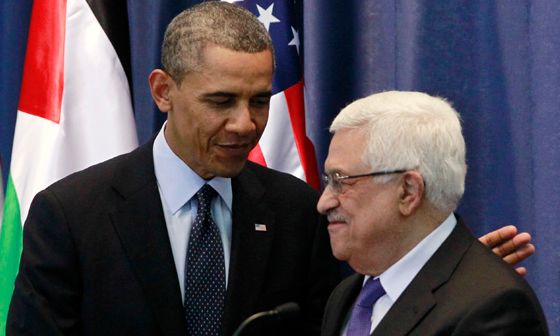Israeli officials say they are unconcerned about tomorrow’s vote in the UN General Assembly where Palestine will become a non-member observer state. The occupation will continue and none of the Jewish settlements will be removed from the West Bank. The Israelis dismiss Mahmoud Abbas as a corrupt political leader who is fighting for his own survival.
Ynet reports: Israel has accepted it cannot stop the Palestinians from going forward with their UN status upgrade bid on Thursday. The General Assembly is set to approve Mahmoud Abbas’ bid to upgrade the Palestinian Authority’s status to from observer to non-member state.
“I wouldn’t overstate the importance of the UN vote,” a senior Israeli official said. “True, we’re going to see fireworks in Ramallah but the settlements will remain exactly where they are and the IDF will continue to operate in the same areas.”
The forum of top nine ministers has yet to decide what steps to take in response but it appears Israel will keep a low profile so as not to turn the focus away from the Palestinian move which clearly violates the Oslo Accords.
Meanwhile, one by one European nations on Wednesday announced their support for the Palestinian bid.
Spain, Switzerland, Denmark and Norway all issued statements announcing they will vote in favor of the status upgrade on Thursday. Meanwhile, Germany and the Czech Republic will likely not endorse the bid.
“I am happy to announce that Denmark will vote in favor … (in) the vote on Thursday,” Danish Foreign Minister Villy Soevndal said in a statement.
“For some time it has been clear that the Palestinians have wanted an upgrade of their status at the United Nations to that of a non-member observer state. After several weeks of talks, a resolution was finally presented yesterday,” Soevndal said.
On Tuesday, France officially announced it would be endorsing the Palestinian bid. It is estimated that most Asian and African nations, with the exception of Malawi, Togo and Cameroon, will also vote in favor of the status upgrade.
Britain is set to abstain as will Italy, Australia and Germany. Israeli officials estimate that other than Israel itself, the US, Canada, Micronesia and Guatemala will vote against the bid.
Having realized the battle has been lost, Israeli officials are trying to downplay the move. “We won’t be passive and sit idly by,” a state official said, “but there’s no need to issue statements. We’ll respond when the time is right.”
Though Israel is accusing the Palestinians of grossly violating the Oslo Accords it has announced it will continue to honor them herself.
However, it has been revealed that Foreign Minister Avigdor Lieberman has recommended deducting the NIS 750 million owed by the PA to the Israel Electric Corp. from the tax money Israel transfers to the Palestinians every month, in accordance with 1994 Paris Agreement.
The state official also dismissed Palestinians threats to try Israeli statesmen and officers over settlement construction in the International Criminal Court. “We need not fear this,” he said.
Meanwhile, Israel is stepping up its criticism of Abbas. A senior official said Tuesday that the Palestinian president is no longer relevant and that his UN bid is meant to guarantee his personal political survival.
Abbas is a corrupt leader, he said, who has postponed the West Bank elections for more than two years as he knows he will lose to Hamas.

